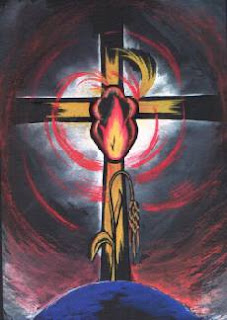SASAMA KA BA?
Linggo ng Palaspas ng Pasyon ng Panginoong Jesukristo
Mk 15:1-39 (Is 50:4-7 / Slm 21 / Fil 2:6-11)
Natitipon tayo upang gunitain ang pasyon ng Panginoong Jesukristo. Bilang Kanyang nagkakaisang sambayanan, halina’t pumasok tayo sa misteryo ng pagpapakasakit, kamatayan, at magmuling-pagkabuhay ni Jesus. Pagnilayan natin ang pag-ibig na banal na sumalungat sa dahas, pag-ibig na nagbata ng karahasan, pag-ibig na naglakbay nang may pasan-pasang krus sa Kanyang balikat. Narito tayo para pasalamatan ang pag-ibig na ito. Dapat naririto rin tayo bilang pakikiisa sa mga taong biktima ng karahasan dahil sa kanilang pag-ibig na magiting at nakapagbibigay-buhay.
Mahigit na sa dalawanlibong taon ang nakalilipas nang si Jesus ay ipako at mamatay sa krus subalit magpahanggang ngayon ang Kanyang krus ay nakatayo pa rin at ang pagdurusang Kanyang dinanas ay hindi pa rin nagwawakas. Sa gitna ng buhay ng sankatauhan nananatiling nakatayo ang krus hindi bilang dekorasyong ritwal lamang kundi bilang paalaala na ito ang maaaring sapitin ng mga radikal na nagsasabuhay ng mga pagpapahalaga ng Ebanghelyo. Kamatayan ang maaaring hingin ng mundo bilang kabayaran sa pagtangging maging maka-mundo at, sa halip, maging maka-Kristo. Tayong mga nagwawagayway ng mga palaspas ngayong araw na ito, nauunawaan ba talaga natin ang ibig sabihin nito? Handa ba tayong mamatay kasama ni Kristo o iiwan din natin Siya? Laan ba tayong mamatay para kay Kristo o kabilang ba tayo sa mga pumapatay sa Kanya?
Subalit maaari ba sanang naiwasan ni Jesus ang kamatayan sa krus? Puwede ba sana Siyang lumihis nang daan nang hindi dumaraan sa Kalbaryo subalit makapagpapatuloy pa rin sa Kanyang paglalakbay? Maaari bang matahimik na lamang Siyang namuhay sa lalawigan ng Galilea sa halip na tila baliw na binangga ang politika at relihiyon sa Jerusalem? Talaga bang kailangan pang humantong sa krus ang mapagpatawad Niyang pag-ibig sa atin?
Maging malinaw sana sa atin ito: Hindi si Jesus ang naghanap ng krus; ang mundo ang nakahanap ng krus bilang paraan para iligpit si Jesus. Hindi imbento ng Ama ang krus; nilikha natin ito. Hindi plano ng Diyos ang krus; solusyon ito ng mundo sa problema nitong si Kristo. Hindi tayo higit na minahal ng Diyos dahil sa krus; sa halip, kahit pa may krus mahal na mahal pa rin tayo ng Diyos. Ang krus ay hindi dahilan ng pag-ibig ng Diyos sa atin; ito ang ibinunga ng pag-ibig Niya sa atin kahit pa tayo ay mga makasalanan. Ang tunay na pag-ibig ay mapagtaya. Itinaya ng Diyos ang Kanyang sariling Anak sa ngalan ng Kanyang pag-ibig sa atin. At sa pagkakaloob Niya sa atin ng Kanyang bugtong na Anak, ipinaubaya Niya Siyang tutuo sa ating mga kamay.
Hindi hinihingi ng pag-ibig ang krus, ngunit sa buhay ni Jesus ang pag-ibig ay humantong sa krus. Yaon ang kinahihinatnan ng pag-ibig na mapaglimot sa sarili. Pasya ng pag-ibig na huwag iwasan ang pagdurusang kaakibat ng pagtatalaga ng sarili. Patuloy na nagmamahal ang tunay na mapagbigay-buhay kahit pa sariling buhay ang ibigay.
Puwede sanang hindi na lang nagpunta si Jesus sa Jerusalem. Puwede sanang sinunod na lamang Niya ang payo ng Kanyang mga alagad na binalaan Siya tungkol sa maaari Niyang sapitin sa Jerusalem. Siya na mismo ang nagsabi sa kanila na sa Jerusalem ay dadakpin Siya ng mga Pariseo, mga eskriba, at mga matatanda ng bayan, pahihirapan, papatayin, ngunit magmuling-mabubuhay sa ikatlong araw. Gayunpaman, sa halip na iwasan ang Jerusalem, heto’t buong hayagan at ingay pa Niyang pinasok ito. Hindi Siya pakubling pumasok o kaya ay sa likod ng lungsod dumaan. Hindi Siya hatinggabi dumating nang walang makapansin. Pumarada pa Siya!
Mulat na mulat ang mga mata, sadyang dumiretso si Jesus sa mga bisig ng Kanyang mga kaaway. Hinarap Niya ang kapangyarihang nakaambang pumatay sa Kanya. Dahil dito, itinambad Niya sa ating harapan ang pagdurusa ng mga naninindigan laban sa mapang-aliping uri. Kung iiwasan ni Jesus ang paghihirap, kakailanganin Niyang iwasan ang makibanggaan sa mga maykapangyarihan. Magbubulag-bulagan Siya sa tunay na paghihirap ng tao at kakailanganin Niyang makipagsabwatan sa katahimikang mapaniil. Ngunit dahil iyon nga mismo ang ayaw Niyang gawin kaya’t ang pag-ibig ni Jesus ay naging biktima rin ng pagdurusa. Iisa lang ang paraan para matakasan ni Jesus ang pagdurusa: ang maging manhid sa paghihirap ng iba, ang talikuran ang lahat ng pakikipagkapwa-tao. At hindi iyon ang Kanyang paraan.
Kumusta naman kaya ang paraan natin? Paano tayo magmahal? Hanggat hindi tayo nagtataya, hindi tayo tunay na nagmamahal. Kung hindi nakapagbibigay-buhay ang pag-ibig natin, huwad na pag-ibig iyon. Kapag iwas tayo nang iwas sa paghihirap, mapagbalatkayo ang pag-ibig natin. Minsan nasasabi natin sa minamahal natin, “Ang hirap mo talagang mahalin.” Pero dapat idugtong pa natin, “Kaya mahal na mahal kita.”
Ngayong Linggong ito, ginugunita natin ang pagpasok ni Jesus sa Jerusalem sa liwanag ng Kanyang pasyon. The passion of Jesus is about His passion to love before it is about His suffering and death. Hindi natin sinasalubong si Jesus; sinusundan natin Siya. Hindi natin dapat isadula ang Kanyang pagpasok sa Jerusalem; dapat nating tularan ang Kanyang pamumuhay. Ang palaspas ay hindi pantaboy ng masasamang espiritu; ito ay tanda ng ating paninindigang tumulad kay Kristo at magmahal gaya Niya.
Bilang mga Kristiyano, nakatalaga tayo na maging isang sambayanang hindi lilimot sa pasyon ni Jesus. At kapag ang isang sambayanan ay nagpapasiyang alalahanin ang pagdurusa, ang alaala nito ay nagiging isang protesta. Mahigpit na hinihingi ng pag-alala sa pagdurusa ang pagsisikap tungo sa isang bukas na hindi lamang pag-uulit sa nakalipas. Kaya nga’t ang alaala ng pagdurusa ay mapanganib:sa paggunita sa paghihirap ng nagdurusa ay may pagprotestang hindi na dapat muling maulit ang paghihirap na iyon. Hangga’t may nagdurusang walang-sala, itinutulak tayo ng alaala ng paghihirap ni Jesus na makibaka laban sa lahat ng masama.
Sasama ka ba?


